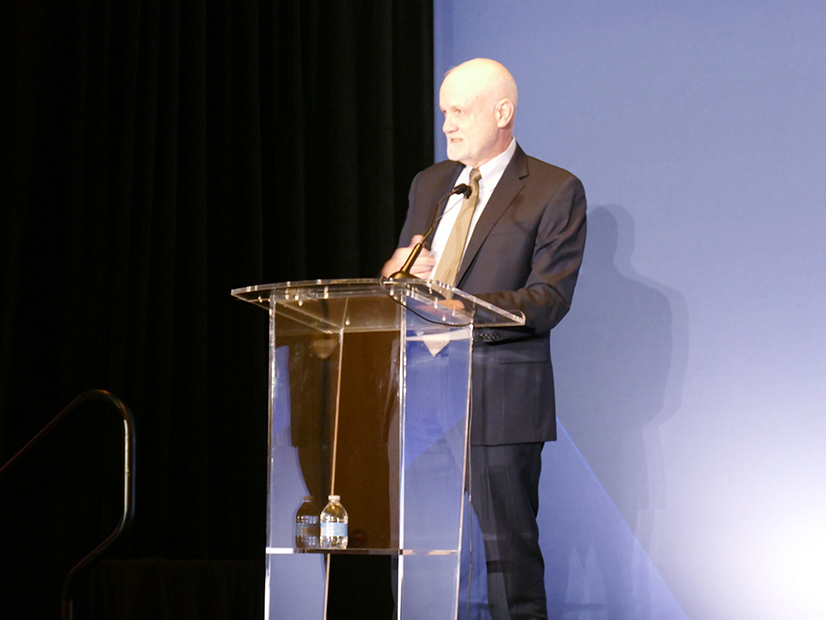President Donald Trump named Mark Christie as FERC chair, hours after he was sworn in during a ceremony in the U.S. Capitol Rotunda.
“I am honored to be appointed FERC chairman by President Trump,” Christie wrote on X. “For four years I have emphasized protecting consumers from excessive power bills, meeting the reliability crisis driven by losses of dispatchable generation and failure to build new generation, in the face of rising demand.”
Meeting those priorities will be his first priority, and Christie added he believes states should be “full partners with FERC” in protecting consumers and ensuring reliability.
The President can pick the FERC chair from among sitting commissioners. The move means former Chair Willie Phillips will become just another commissioner, if he decides to stay. In his last press conference at the helm of the agency Jan. 16, Phillips declined to publicly discuss his plans.
“I told you all from the beginning: Reliability is job No. 1 of the commission,” Phillips said. “I am very proud of the work we’ve done to protect the reliability of our system for our nation.”
Phillips’ term runs through June 2026. If he stays on, Christie will work with a 3-2 Democratic majority for the first year and a half. Christie was appointed by Trump in July 2020, and his term expires this June, though he could be renominated. Even if he is not, he can stay until the end of the year when Congress adjourns absent a replacement being confirmed.
Christie said in an interview that the new job is “an awesome responsibility” and though he was chair of the Virginia State Corporation Commission, FERC is at a bigger scale.
“And the biggest thing you know at my age is you realize how many — literally millions of people — are going to be affected by what you do,” he said. “I mean, what we do affects their monthly power bills, and that is a tremendously daunting challenge. We’ve got to make sure that we do everything we can to minimize the impact on the people’s monthly power bills.”
Reliability will continue to be a big focus under Christie, as demand is growing while power plants continue to retire. He has talked about a reliability crisis in public remarks for several years.
“It is absolutely deteriorating, and that’s not my opinion,” Christie said. “We see that in the reports from NERC. You see it in the reports from the RTOs, like PJM. We continue to lose the very resources we need to keep the lights on and the heat pumps going.”
With a cold front hitting the East Coast this week, PJM could break its all-time winter demand record and has fewer resources than it did last year, he added.
FERC has no control over why demand is going up, which largely is due to the expansion of data centers in the development of artificial intelligence.
“We have to accept that we have to serve load, and that’s going to mean keeping the generating resources that we need and stopping the retirements and building the new resources,” Christie said. “Those are big issues, and we have to address them. It really is supply and demand. It’s no more complicated than that.”
Tightening supply and expanding demand generally means higher prices, so Christie will look for ways to control those. One position he’s made clear in numerous dissents is that transmission incentives should be reined in. He also said he wants to address local transmission projects, which in PJM are 80% of the recent construction and often are lightly regulated. (See How FERC Under Trump Might Advance Energy Affordability in 2025.)
“As a utility regulator, I know that you’re always faced with the challenge of balancing the need for utility assets like transmission and generation with the need to keep costs down for customers,” Christie said. “And it’s a tough balance … but it’s what utility regulators do.”
One issue that roiled the FERC world after Trump’s election was his campaign promise to remake how the federal workforce is overseen. What that means for an independent regulatory agency like the commission remains to be seen. (See Chatterjee Post Leads to Worries About FERC’s Independence, Staff Exodus.)
Without any formal guidance from the White House on the federal workforce front, Christie declined to comment.
While the administration and Senate have changed parties and that will have an effect on FERC, by design it will not have as big an impact as on other executive agencies.
“Things don’t change overnight at FERC, because obviously we’re a multi-member commission, and you have to have a majority to do anything,” Christie said. “But I think there’s a lot of agreement among my colleagues on the need to address these issues.”
Trump also Elevates Wright to NRC Chair
Christie is not the only former state regulator to get a promotion on a federal regulatory agency. Trump tapped David Wright to be chair of the Nuclear Regulatory Commission in the same announcement. Wright has been on the NRC since 2018 and was on the Public Service Commission of South Carolina from 2004 to 2013, which included a stint as chair.




